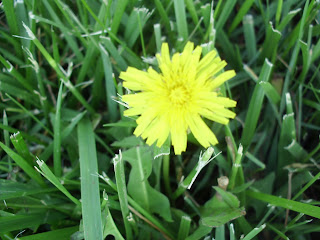Any plant which grows where it is not wanted is considered a weed, right? Clover in the drive, dandelions in the yard, grass in the garden, violets by the gate, chickweed in the patio pavers. People spend a considerable amount of time pulling those weeds and money on herbicides killing those weeds. Folks consider weeds to be ugly and harmful to the plants they have growing in the garden and the yard.
Well, I am ready to make a not-so-popular declaration. Weeds really are not all that bad. In fact, having a few weeds in good. Weed free is really not so good.
Have you ever noticed, when God plants a garden, when planting environments are allowed to grow up naturally, lots of different kinds of plants grow together. Think of a meadow. Grasses, wildflowers and "weeds" all grow together. You see, this is actually a very healthy plant environment. It is the way God intended it. As a result of all of these plants being mixed together, they are healthier, because the plants support one another. A deep rooted plant, such as dandelion, reaches down to the nutrients that the shallower plants can't reach, and brings that nutrients closer to the surface.
That spring of milkweed will attract caterpillars, keeping them off of the rudbuckia.
It is a fact that a diverse environment is a healthy environment. Keeping large spaces of one single species is not the way God intended it. Planting 5 acres of Kentucky Bluegrass, may look beautiful (in the same way a stick thin, made up model looks beautiful) but that is neither healthy, nor the way God intended our 5 acres to be.
That being said, I do realize there are times when weeds do need to be removed. Spending thousands of dollars on a patio or driveway is a good reason to kill the grass growing up through the pavers. Pulling the grass that is growing under the tomatoes is wise, because tomatoes won't grow well with another plant smothering their "feet".
The problem with today's culture is that there is an idea that every weed needs to be removed. Instead of using harmful chemicals to treat the entire yard, simply spray the one large patch of violets and embrace the rest. Violets really are beautiful and edible. Harvest them instead of killing them. Instead of spending hours digging every single dandelion from the yard, dig a few and have the kids harvest the rest. Your vegetable garden does not need to be weed free to produce an abundance of veggies. More than once I have had someone comment on my beautiful weeds in my veggie patch. I love growing a large garden, but I have 2 small children and I refuse to spend their entire childhood pulling weeds. Despite my "lack" of "good gardening technique" I always have an abundant harvest and I rarely have problems with insect infestation.
Okay, so here is the not so ugly truth about weeds. You don't have to spend all of your time and money getting rid of them. A few weeds in the garden and yard is good. A lot of weeds in the garden or the yard is fine, maybe even good. Zero weeds in the garden or yard is actually bad. Weeds actually have many benefits. They attract beneficial animals/insects. Weeds help prevent bad animals/insects from eating your plants. They can increase nutrients in your soil. Some weeds can be harvested for the dinner table. Many weeds are actually beautiful. A few minutes a day pulling weeds in the garden is good. Hours and hours a week pulling weeds in the garden is bad. A little vinegar poured on the cracks of the patio to kill the grass is good. A huge sack full of weed and feed poured over the entire estate is bad.
So, there you have it. Grab yourself a cup of coffee, sit back and relax. Say a little prayer thanking the Creator for that little patch of clover, which has helped feed the grass with it's long roots and attract the little bee that has helped to pollinate your apple tree. And, if a well meaning friend gasps and says to you, "My husband would die if he saw all of those weeds in your garden!", just smile and tell her you are practicing an amazing new companion planting technique.
~ Rebecca




No comments:
Post a Comment